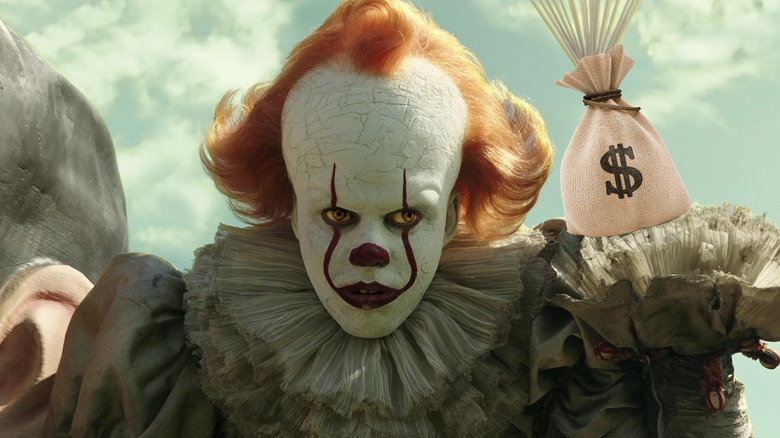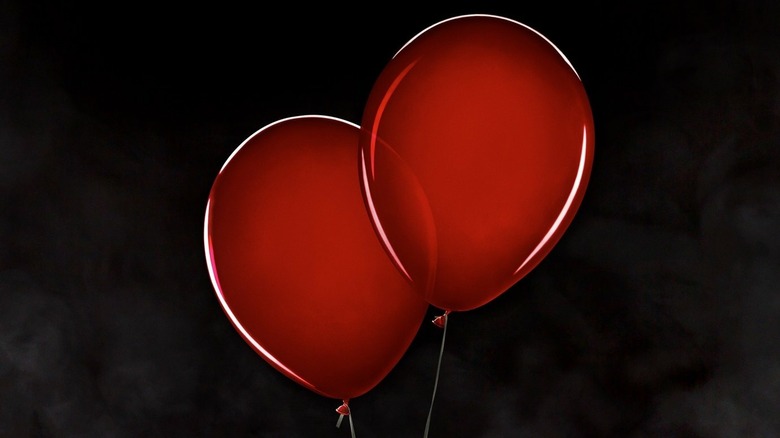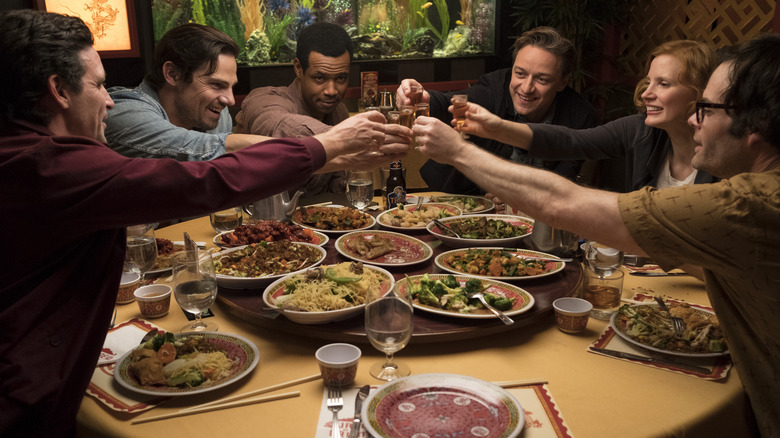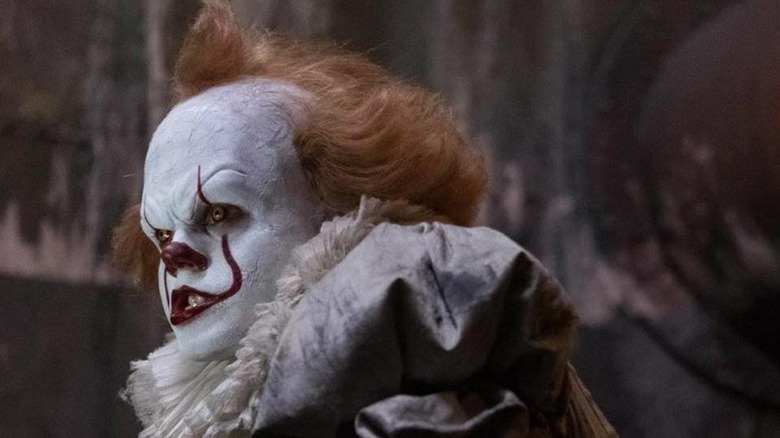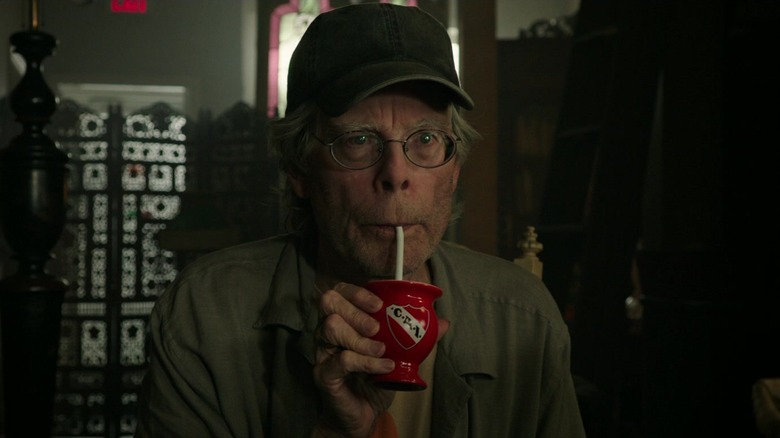5 Years Ago, A Huge Horror Box Office Hit Had To Live In The Shadow Of Its Predecessor
(Welcome to Tales from the Box Office, our column that examines box office miracles, disasters, and everything in between, as well as what we can learn from them.)
The curse of success is a fascinating thing in Hollywood. It has always been a "What have you done for me lately?" business. In the case of director Andy Muschietti, in the fall of 2017, he delivered Warner Bros. the biggest horror movie of all time when he nailed an adaptation of Stephen King's much-beloved novel "It." While King's novel had previously been adapted as a TV miniseries in the '90s, Muschietti's take on the material resonated with audiences in a way that nobody could have predicted. The great news for all involved is that King's novel is an unwieldy beast that no one movie could possibly hope to contain.
So, Warner Bros. enlisted Muschietti to get to work right away on a sequel, which hit theaters almost exactly two years later in September 2019. "It Chapter Two" was a massive success by just about every measure. It remains one of the biggest horror movies ever made, it made back more than six times its budget at the global box office, and it successfully managed to bring the story of Pennywise and The Losers Club to a close. The only problem? The sequel had to live in the shadow of its impossibly successful predecessor, meaning it was never going to be judged on its own merits, critically or commercially speaking.
In this week's Tales from the Box Office, we're looking back at "It Chapter Two" in honor of its fifth anniversary. We'll go over how the sequel was put together very quickly, what Muschietti did with his larger budget, what happened when the sequel hit theaters, what happened in the aftermath of its release, and what lessons we can learn a handful of years removed. Let's dig in, shall we?
The movie: It Chapter Two
Before diving into the specifics of this movie, it's worth going over what happened with "It: Chapter One" (then just called "It") when it hit theaters in 2017. After being stuck in development hell for years, Muschietti finally cracked the code and got the project across the finish line with a lineup of fresh faces to play the young versions of The Losers Club, as well as the ace in the hole, which was Bill Skarsgård as Pennywise. It all made for an incredibly marketable production, one that also tapped into '80s nostalgia by shifting the timeline compared to King's novel.
The final product was a bigger hit than anyone could have predicted, taking in more than $700 million worldwide to become the highest-grossing horror movie of all time. It's worth emphasizing just how much the movie over-performed. Even heading into opening weekend, projections were in the $60 million range. The film ended up opening to $123 million. It was one of the biggest over-performances in box office history, particularly given the film's relatively tiny $35 million budget.
The other thing the film had going for it was overwhelming support from both critics and audiences alike. The first chapter currently holds an 85% critical approval rating on Rotten Tomatoes, with an equally great 84% audience score. As Karen Han wrote in her 9 out of 10 review of "It" in 2017, "As exciting as it is to consider what a second run through this universe will feel like, it'll be a pity to leave the adolescent Losers' Club behind." Therein lies the rub.
One of the things that made the first film work like gangbusters was the young kids who were chosen to play The Losers Club. King's novel weaves the tale between the group as kids and as adults 27 years after their first encounter with Pennywise, going back and forth. To make the story work cinematically, Muschietti and writer Gary Dauberman wisely chose to focus on the kids only in the first installment. That backed them into a bit of a corner with the sequel.
The Losers Club grows up in It Chapter Two
The sequel brings The Losers Club — who've long since gone their separate ways – back together as adults, 27 years after the events of the first film. Pennywise has re-emerged and the Losers must face their fears, band together, and defeat the deadly clown for good. Wisely, Muschietti brought back the younger cast in certain flashback scenes, including Jaeden Martell (Bill), Wyatt Oleff (Stanley), Jack Dylan Grazer (Eddie), Finn Wolfhard (Richie), Chosen Jacobs (Mike), Jeremy Ray Taylor (Ben), and Sophia Lillis (Beverly).
However, the success of the first "It" meant that they could dream big when it came to casting the adult versions of the Losers. As a result, Muschietti nabbed James McAvoy ("Split"), Andy Bean ("Power"), James Ransone ("Sinister"), Bill Hader ("Saturday Night Live"), Isaiah Mustafa ("Shadowhunters"), Jay Ryan ("Beauty and the Beast"), and then-Oscar-nominee (now Oscar-winner) Jessica Chastain ("Zero Dark Thirty"). It was a mix of A-listers, up-and-comers, and character actors that felt like a win from top to bottom.
The problem, from a production standpoint, was the younger stars. Two years is a lot of time for a teenager and several members of the cast noticeably aged in that time. As a result, they had to be digitally de-aged for "Chapter Two," which Muscietti said was "part of the budget" from the beginning. Still, it was an imperfect solution to one of the problems that the sequel had to contend with. Namely, could focusing on the adult cast possibly capture that same vibe of the first film?
"In a weird way this movie resembles the structure of the book, in that it goes back and forth," McAvoy said in July 2010 a couple of months before the film hit theaters. Muschietti also said that the things people loved about the first movie would be "cranked up" in the sequel. Unfortunately, the reality is that being a kid is far more fun than being an adult, even when creepy clowns are involved. That was always going to be a hurdle in choosing to adapt the book this way. Even so, audiences were bought in at a certain level given just how much of a cultural phenomenon that the first movie had become. That was both a blessing and a curse.
The financial journey
"It Chapter Two" hit theaters On September 6, 2019, nearly two years to the day after the first film arrived. Warner Bros. and Muschietti wisely made quick work of it, even if that was a difficult thing to do. The hype was still very much alive and, credit where credit is due, the studio's marketing team did its part. From a clever teaser poster with Pennywise holding two red balloons instead of one to a teaser trailer that hinged on one of the film's particularly horrifying scenes, the imagery was easy to hook audiences with, even if critics weren't as universally on board this time around.
The sequel was met with a more mixed response, with /Film's Chris Evangelista calling the film "messy" in his review while also saying that it "understands what makes Stephen King so special." The film holds a 62% approval rating on Rotten Tomatoes which is certainly good, but not great. Part of the problem is that this sequel had to shoulder the weight of what came before. Living in another movie's shadow is never easy.
Even so, the sequel debuted with a stellar $91 million opening weekend, the second-best opening for a horror movie up to that point behind only the first "It." The rest of Hollywood largely stayed away, understanding that Warner Bros. had an automatic hit on its hands. That proved true, even if it wasn't quite as big as the original. Then again, nothing is, as the original was the biggest horror movie ever. Nothing should have to use that as a measuring stick for success. But that's the burden shared by all sequels to hit movies, in some way.
Muschietti's sequel stayed on two for two more weekends before surrendering the crown to "Downton Abbey," of all things. In the end, "It Chapter Two" pulled in $211.5 million domestically to go with $261.5 million overseas for a grand total of $473 million worldwide. Even when taking the sequel's much bigger $79 million budget into account. Under just about any circumstance, this would be considered an unqualified hit. This movie is still a hit, to be certain, but one that will always have an asterisk next to its name.
It Chapter Two had to settle for goodness measured against greatness
"It Chapter Two" made more money than almost any other horror movie ever made. Even if we generously include the likes of "Hotel Transylvania" and "I Am Legend" as horror movies, it still sits at least at the number eight spot on the all-time chart for the genre above William Friedkin's "The Exorcist" ($441 million worldwide) and only below such titans as Steven Spielberg's "Jaws" ($483 million) and M. Night Shyamalan's "The Sixth Sense" ($672 million). What is that if not success?
Unfortunately, this film had to live in the shadow of greatness. Even with a runtime of close to three hours, it had to contend with wrapping up King's uncompromisingly huge story, which wasn't easy. Muschietti's director's cut was 3 hours and 25 minutes long before that was cut down for theaters. Coupled with the less fun nature of following the Losers as adults, was it ever going to be possible for the sequel to be as good as the first "It?" Maybe not.
Even so, it would be tough to say that all involved were anything but fully committed to the task. "Andy had me dressed in blood for the whole end of the film," Chastain said in a 2019 interview about what she endured for the film's third act. "Before every take, they had a small kiddie pool filled with the cold blood, and [they'd] pour it on me." Chastain didn't phone it in, nor did anybody else for that matter. The end result just didn't resonate with audiences in the same way, which almost feels like destiny in a case like this.
There's a reason we hold up stuff like "The Empire Strikes Back" and "Terminator 2: Judgment Day" in such high regard. Making sequels that outdo the original is nearly impossible. Unfortunately for "It Chapter Two," this sequel had to merely settle for being good while always being compared to the greatness that came before. That's a tough spot for any movie to be in.
The lessons contained within
It's difficult for me to not bring myself to this a bit. "It" was my personal favorite movie of 2017. "It Chapter Two" was my most-anticipated movie of 2019, and I seem to enjoy it more than many. I'm personally able to take the sequel's perceived imperfections in stride. In a 2017 interview with The Independent, Muschietti laid out the difficulties that inherently exist in trying to adapt a 1,200-page novel — particularly this 1,200-page novel — into two movies.
"You would never walk into a studio and try to pitch a movie where they're fighting an evil clown who eats children, and there's sexual abuse, but also very funny bits. It's a bit ridiculous as a concept for a movie, but the truth is that Stephen King made an incredible, memorable, and beautiful story, and I tried to stay true to the spirit of it."
For me, that's what it goes back to. Taken as a whole, both "It" films are a pretty remarkable case study in taking King – the good, bad, and the messy of it all – and making it work for the masses. King's book is f***ing weird. Muschietti embraces the weird. He embraces the dark. He embraces it all, as best he can. That's admirable, to my eye.
I'd also argue that, sometimes, a movie should be judged on its own merits. "It Chapter Two" was a remarkably big success, yet its reputation five years later makes it feel like a disappointment. That's truly crazy. To me, it's not unlike how every "Alien" movie has to measure up to Ridley Scott's "Alien" and James Cameron's "Aliens." Is that even fair at some point? Can any movies ever be expected to measure up to that? "It Chapter Two" had to measure up to a movie that was very fresh in people's minds. That's rough riding.
Who knows? Maybe in another five years, we'll get a round of think pieces that say something to the tune of, "It Chapter Two is good, actually." Maybe Muschietti will make the supercut of the two movies that he's long teased. Maybe that will change the perception of it all. Maybe the upcoming miniseries "Welcome to Derry" will shed new light on things. Whatever the case, we should at least acknowledge, here and now, that this was a hugely successful sequel regardless of what comparisons there are to make.
